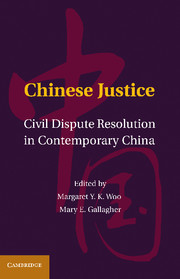Book contents
- Frontmatter
- Contents
- Tables and Figures
- Contributors
- Acknowledgments
- Abbreviations
- Glossary
- Introduction
- PART I LEGAL DEVELOPMENT AND INSTITUTIONAL TENSIONS
- PART II PU FA AND THE DISSEMINATION OF LAW IN THE CHINESE CONTEXT
- PART III LAW FROM THE BOTTOM UP
- 9 A Populist Threat to China's Courts?
- 10 Dispute Resolution and China's Grassroots Legal Services
- 11 The Constitution in the Courtroom: Constitutional Development and Civil Litigation in China
- Conclusion: Chinese Justice from the Bottom Up
- Index
- References
9 - A Populist Threat to China's Courts?
Published online by Cambridge University Press: 05 July 2011
- Frontmatter
- Contents
- Tables and Figures
- Contributors
- Acknowledgments
- Abbreviations
- Glossary
- Introduction
- PART I LEGAL DEVELOPMENT AND INSTITUTIONAL TENSIONS
- PART II PU FA AND THE DISSEMINATION OF LAW IN THE CHINESE CONTEXT
- PART III LAW FROM THE BOTTOM UP
- 9 A Populist Threat to China's Courts?
- 10 Dispute Resolution and China's Grassroots Legal Services
- 11 The Constitution in the Courtroom: Constitutional Development and Civil Litigation in China
- Conclusion: Chinese Justice from the Bottom Up
- Index
- References
Summary
Is the Chinese party-state too responsive to public opinion? In the case of the courts, this may be the case. Western literature has devoted extensive attention to the problems in the Chinese legal system, in particular in the courts, describing a system that continues to be undermined by a range of problems, from corruption to lack of competence to continued Communist Party intervention. Likewise, existing literature describes a legal system that often is unresponsive to individual demands for justice. In this chapter, I examine another possibility: that one impediment to the development of courts that are able to protect individual rights is that courts are too responsive to protests, petitions, and public opinion.
This chapter presents evidence that protesting, petitioning, or simply threatening to do either often is a successful means for litigants to pressure courts to rule in their favor or to alter decided cases. The ability of individuals to influence court decisions through petitioning is linked to other better-known problems in the Chinese legal system. Courts' sensitivity to the threat of unrest reflects the facts that party officials continue to interfere in court decisions and that individual judges and court leaders are dependent on party officials for their positions. Sensitivities to popular opinion and to individual protesters also reflect a political system that has placed tremendous emphasis on maintaining social stability.
- Type
- Chapter
- Information
- Chinese JusticeCivil Dispute Resolution in Contemporary China, pp. 269 - 313Publisher: Cambridge University PressPrint publication year: 2011
References
- 36
- Cited by



